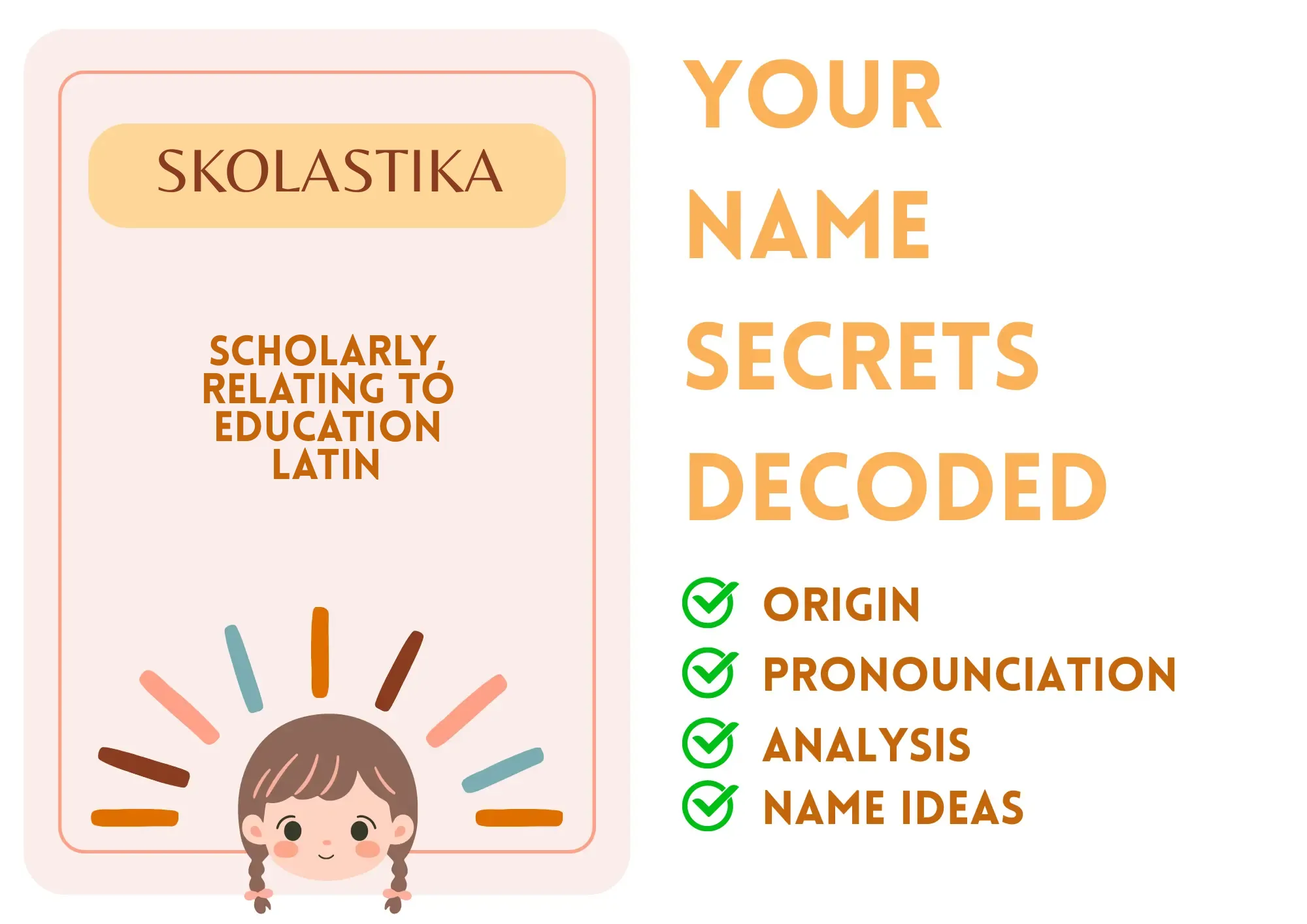
Skolastika
Skolastika is a name with rich historical and cultural significance, stemming from the Latin word 'schola', meaning 'school' or 'scholarship'. It is traditionally used in various cultures as an homage to learning and education. As an uncommon name, it is often given to girls and carries a distinctly feminine feel.
The name Skolastika is particularly associated with education and wisdom, making it an appealing choice for parents who value academic pursuits and intellectual prowess. It is easy to write with its rhythmic, four-syllable cadence and is often described as elegant and unique.
Although not widely prevalent in popular culture, Skolastika may have references in literary works or discussions surrounding education. Overall, it represents a blend of cultural depth and a nod towards a learned lineage, making it a thoughtful choice for a baby girl.
Basic Information
Gender: Girl
Sounds Like: sko-lahs-tee-kah
Pronunciation Explanation: The emphasis is on the second syllable 'lahs', with the 's' in 'sko' being soft and the final 'ka' pronounced clearly.
Summary and Meaning
Meaning: scholarly, relating to education (Latin)
Origin: Skolastika has Latin origins, related to the word 'schola', emphasizing education and learning.
Usage: Skolastika is traditionally a feminine name, reflecting its associations with wisdom and education.
Name Number (Chaldean)
Name Number (Pythagorean)
Popularity (Global Rank)
Overall: 120443
Girls: 77177
Most Popular in
Religious and Cultural Significance
Religion: Christian
Background: In Christian culture, the name Skolastika is linked to St. Scholastica, the patron saint of Benedictine nuns, known for her learning and piety.
Cultural Significance: The name is culturally significant in communities that value education, Christianity, and female empowerment.
Historical Significance: Skolastika is historically notable due to its association with St. Scholastica, who lived in the 5th century and is recognized for her commitment to education and spirituality, establishing the foundation for women's religious communities.
Popular Culture
Literature and Mythology: While not common in popular literature, the historical St. Scholastica serves as an inspiration in various writings about faith and education.
Movies and Television: References to characters or stories involving intellectual pursuits may indirectly invoke the essence of Skolastika, symbolizing learning and wisdom.
Feelings and Perceptions
Perception: Skolastika evokes feelings of respect and admiration, reflecting intelligence and a connection to educational values. It is often seen as unique and sophisticated.
Positive Feelings: Intelligent, cultured, empowering, unique, wise.
Negative Feelings: Possibly seen as overly formal or unfamiliar in modern contexts.
Practical Considerations
Ease of Writing and Calling: Skolastika is somewhat straightforward to write, though its length may make it less common in everyday usage. The four syllables make it melodious, but some may find it challenging to pronounce correctly on first attempt.
Common Typos and Misspellings: Skolastica,Skolastika,Scholastika,Skolastika
Common Nicknames: Skola,Stika,Kiki,Lasa
Skolastika Popularity
Skolastika Usage and Popularity By Country
| Country | Rank (Overall) |
|---|---|
| Indonesia | 8315 |
| Australia | 68209 |
| United Kingdom | 90588 |
| France | 158953 |
Skolastika Usage and Popularity By City
| City | Rank (Overall) |
|---|---|
| Jawa Timur | 4956 |
| Jakarta | 11344 |
| Yogyakarta | 4207 |
| London | 46025 |
| Semarang | 2101 |
Compatibility Analysis
Famous Persons Named Skolastika
No results found for Skolastika.
Related Names
Similar Sounding Names:
Samika,Anastasia,Kalista